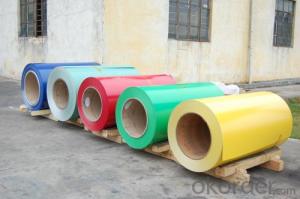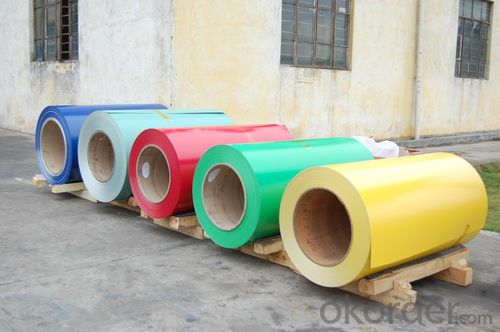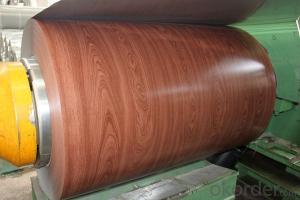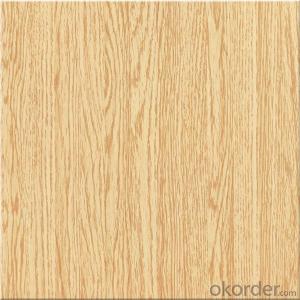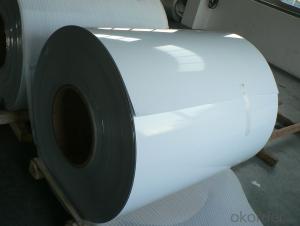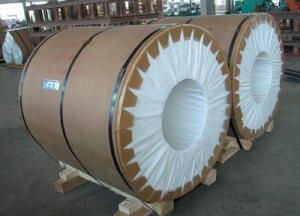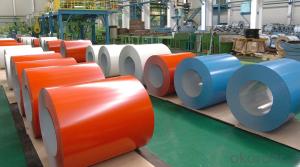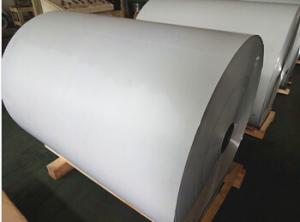032 Aluminum Coil Black - Prime Z40 Coating Color Aluminum Coil with High Quality
- Loading Port:
- Shanghai
- Payment Terms:
- TT OR LC
- Min Order Qty:
- 5 m.t.
- Supply Capability:
- 10000 m.t./month
OKorder Service Pledge
OKorder Financial Service
You Might Also Like
Specification
1. Specification of Prime Z40 Coating Color Aluminum Coil with High Quality
Material | Alloy Aluminum 6063,6061,6005 or customer nominated |
Temper | T3, T4, T5, T6 |
Surface | Anodize, electrophoresis, powder coating, PVDF coating, wood grain painting, matted, etc. |
Colour | Any colour based on Standard Germany RAL Mark |
Length | Coating 6.5 meters, Anodizing 6.5 meters, Mill finish 5 meters |
Press Machine | 500-4000 tons all together 64 press lines. |
Fabrication | 1. Windows and doors; 2. Drilling; 3. Bending; 4. Cutting; 5. etc. |
Certificate | ISO 9001 |
Moulding | 1. Using our moulds, no fee; |
2. Using customer drawing, opening mould, usually about 10~50 tons then the moulding can be refunded. | |
3. Mould cost is negotiable base on the order quantity | |
Capability | Annual output 100,000 tons |
2. Application of Prime Z40 Coating Color Aluminum Coil with High Quality
(1).Interior: wall cladding, ceilings, bathrooms, kitchens and balconies, shutters, doors...
(2).Exterior: wall cladding, facades, roofing, canopies, tunnels,column covers , renovations...
(3).Advertisement: display platforms, signboards, fascia, shop fronts...
3. Feature of Prime Z40 Coating Color Aluminum Coil with High Quality
*Such coil is specially designed to replace aluminum ingot, due to the high export tax of aluminum ingot, the coil has better price than ingot.
*This type of coil can fit customer's remelting furnace just like ingot, no need to make any change to the production line that was previously used for ingot. The standard coil size and weight is very suitable for the feed gate of furnace.
*This type of coil causes less material wastage than ingot when remelted.
*Our coil is made directly from ore, no need to go though the ingot making process, quality is much better than other suppliers who use ingot scrap to make coil.
Be free from Oil Stain, Dent, Inclusion, Scratches, Stain, Oxide Dicoloration, Breaks, Corrosion, Roll Marks, Dirt Streaks and other defect which will interfere with use
4. Certificate:
SGS and ROHS(if client request, paid by client), MTC(plant provided), Certificate of Origin(FORM A, FORM E, CO), Bureau Veritas and SGS (if client request, paid by client), CIQS certificate
5. Image of Prime Z40 Coating Color Aluminum Coil with High Quality
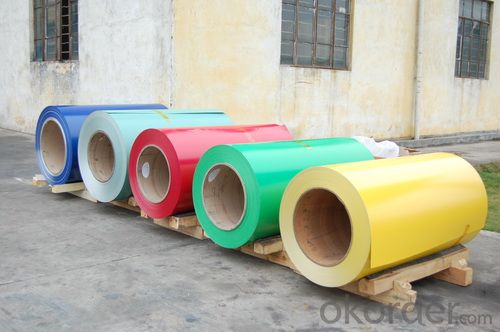
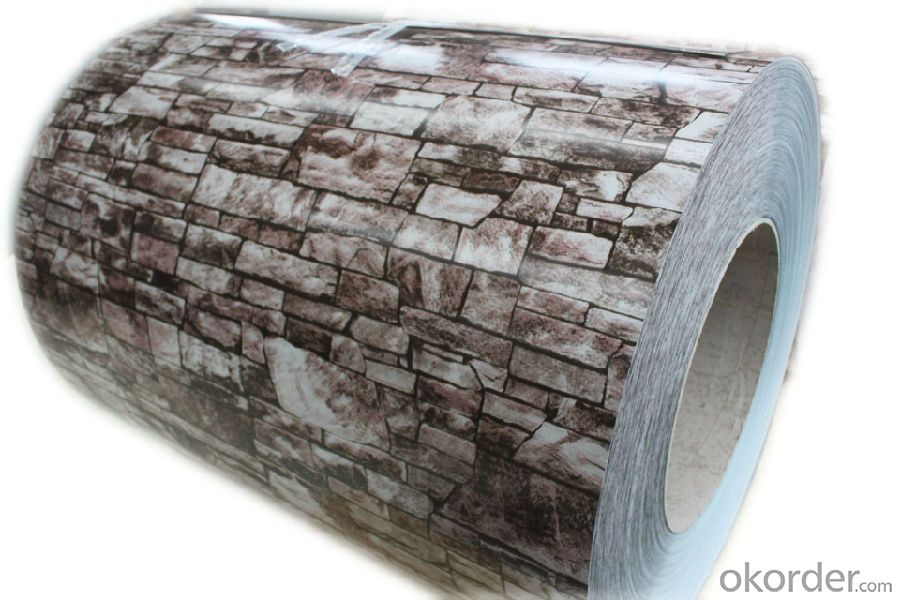
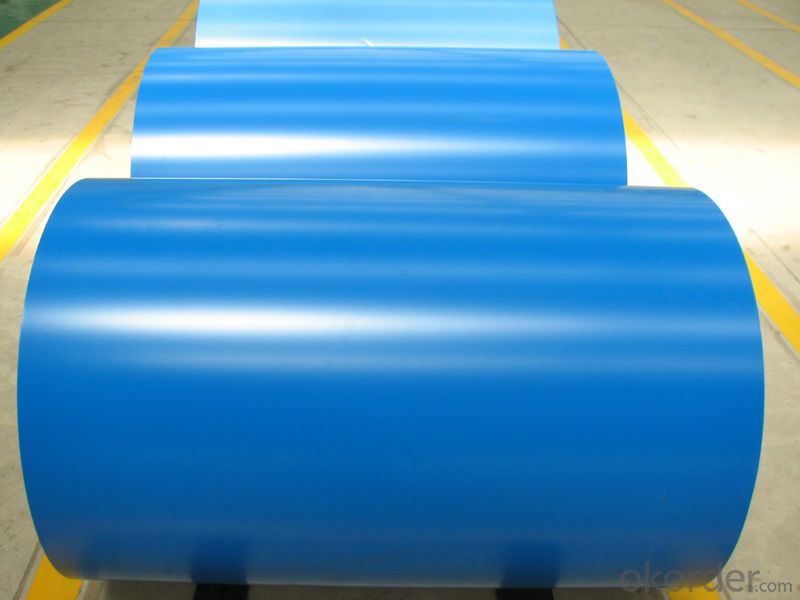
6. Package and shipping of Prime Z40 Coating Color Aluminum Coil with High Quality
eye to wall
eye to the wall
with wood pallet (wooded case also available)
7. FAQ
1) What is the delivery time?
Dpends on actual order, around 20 to 35 days
2)What is the QC system:
We have QC staff of 20 persons and advanced equipment, each production is with MTC traced from Aluminum ingot lot.
3) What market do you mainly sell to?
Australia, America, Asia, Middle East, Western Europe, Africa etc
- Q: What are the common surface finishes available for aluminum coils?
- There are several common surface finishes available for aluminum coils, each offering unique benefits and aesthetic appeal. One of the most popular finishes is mill finish, which is the standard finish applied to aluminum coils straight from the mill. Mill finish provides a smooth, shiny surface without any additional treatments or coatings. Another common surface finish for aluminum coils is anodized finish. Anodizing involves an electrochemical process that creates a durable, corrosion-resistant layer on the surface of the aluminum. This finish can be clear or colored, providing a wide range of options for design and customization. A painted or coated finish is another popular choice for aluminum coils. This involves applying a layer of paint or coating onto the surface of the aluminum to enhance its appearance and protect it from corrosion. Painted finishes can be customized in terms of color, gloss level, and texture, allowing for endless design possibilities. Additionally, brushed finishes are often used for aluminum coils. This finish involves brushing the surface of the aluminum with abrasive materials, creating a pattern of fine lines or scratches. Brushed finishes offer a unique, textured appearance that can add visual interest to various applications. Laminating is another surface finish option for aluminum coils. This process involves applying a thin layer of film or other material onto the surface of the aluminum, providing additional protection against scratches, UV rays, and other elements. Laminated finishes can be glossy or matte, depending on the desired look. Overall, the common surface finishes available for aluminum coils include mill finish, anodized finish, painted or coated finish, brushed finish, and laminated finish. Each finish offers its own set of advantages and can be chosen based on specific requirements such as aesthetics, durability, corrosion resistance, and customization options.
- Q: What is the role of aluminum coils in the construction of ships?
- Aluminum coils are used in the construction of ships primarily for their lightweight and corrosion-resistant properties. They are commonly used in the fabrication of ship hulls, decks, and superstructures. The use of aluminum coils reduces the overall weight of the ship, improving fuel efficiency and increasing payload capacity. Additionally, the corrosion resistance of aluminum helps to prolong the lifespan of the ship, reducing maintenance costs in the long run.
- Q: Explain the relationship between aluminum coil and aluminum alloy in a few sentences.
- <p>Aluminum coil and aluminum alloy are related in that aluminum coil can be made from aluminum alloy. An aluminum alloy is a material composed of aluminum and other metallic or non-metallic elements, which are mixed to enhance its properties. Aluminum coils are long, rolled sheets of aluminum that can be made from various types of aluminum, including alloys. The use of an alloy allows for the creation of aluminum coils with specific characteristics, such as increased strength, corrosion resistance, or formability, depending on the application requirements. Thus, aluminum coils are often manufactured from aluminum alloys to meet the demands of diverse industries.</p>
- Q: How do aluminum coils contribute to LEED certification requirements?
- Aluminum coils contribute to LEED certification requirements by fulfilling several criteria. Firstly, aluminum is a highly sustainable material as it is 100% recyclable and has a low carbon footprint. This aligns with LEED's focus on reducing environmental impact. Additionally, aluminum coils are often used in energy-efficient HVAC systems, which can help buildings achieve energy efficiency credits required for LEED certification. Furthermore, aluminum coils are durable and long-lasting, reducing the need for frequent replacements, which aligns with LEED's focus on durability and life-cycle assessments. Therefore, the use of aluminum coils can positively impact a building's LEED certification by contributing to sustainability, energy efficiency, and durability requirements.
- Q: Can aluminum coils be used in heat exchangers?
- Yes, aluminum coils can be used in heat exchangers. Aluminum is a popular choice for heat exchangers due to its excellent thermal conductivity and corrosion resistance. The high thermal conductivity of aluminum allows for efficient heat transfer, making it an ideal material for heat exchangers. Additionally, aluminum's corrosion resistance ensures that the coils will remain durable and functional even in harsh environments.
- Q: Can aluminum coils be used in the production of transportation vehicles?
- Yes, aluminum coils can be used in the production of transportation vehicles. Aluminum is a lightweight and corrosion-resistant material, making it a popular choice in the automotive industry. Its high strength-to-weight ratio helps improve fuel efficiency, reduce emissions, and increase overall vehicle performance. Aluminum coils can be used to manufacture various components of transportation vehicles such as body panels, frames, chassis, and suspension parts. Additionally, aluminum's recyclability makes it environmentally friendly and contributes to the sustainability of the transportation industry.
- Q: This question asks for a comparison of the benefits and drawbacks associated with the use of aluminum coil in various applications.
- <p>The advantages of using aluminum coil include its lightweight nature, which reduces transportation costs and enhances energy efficiency. It also has excellent thermal conductivity, making it ideal for heat exchangers and cooking utensils. Aluminum coil is corrosion-resistant, which extends its lifespan and reduces maintenance. It is also recyclable, contributing to sustainability. Disadvantages include lower strength compared to steel, which may limit its use in heavy-duty applications. It also has a higher cost than some other metals, which can affect its competitiveness in certain markets. Additionally, aluminum is a good conductor of electricity, which can be a disadvantage in applications where electrical insulation is required.</p>
- Q: The user is asking if it's possible to recycle old aluminum coils to create new ones.
- <p>Yes, you can recycle old aluminum coils into new ones. Recycling aluminum is a highly efficient process, and it's very common in the industry. Aluminum has one of the highest recycling rates among metals due to its value and the energy savings associated with recycling compared to producing new aluminum from raw materials. When you recycle aluminum, it can be melted down and reformed into new coils or other products without losing its properties. This process helps conserve resources and reduces environmental impact.</p>
- Q: Can aluminum coils be used for electrical wiring?
- Indeed, electrical wiring can make use of aluminum coils. Aluminum, known for its exceptional electrical conductivity, has served as a reliable choice for electrical wiring in the past. Nevertheless, it is worth noting that aluminum wiring is not as commonly employed as copper wiring due to certain concerns. Specifically, aluminum exhibits a higher resistance compared to copper, potentially resulting in increased power losses and heat generation. Additionally, aluminum has a tendency to oxidize, posing potential fire hazards. In order to address these issues, special measures must be taken when utilizing aluminum wiring, such as employing larger gauge wires and utilizing connectors explicitly designed for aluminum. While copper wiring is generally preferred due to its lower resistance and superior conductivity, aluminum wiring can still be utilized effectively with proper precautions.
- Q: Are aluminum coils suitable for automotive body panels?
- Indeed, automotive body panels can be effectively constructed using aluminum coils. The lightweight nature of aluminum greatly contributes to enhancing fuel efficiency and overall vehicle performance. Furthermore, the exceptional corrosion resistance of aluminum makes it an optimal selection for automotive applications, particularly when the panels are frequently subjected to diverse weather conditions. The impressive strength-to-weight ratio of aluminum further ensures outstanding durability and crash resistance. Moreover, aluminum allows for effortless formation and shaping, enabling the creation of intricate and fashionable designs. In conclusion, the utilization of aluminum coils for automotive body panels presents a multitude of benefits, making it a highly favored option for car manufacturers.
Send your message to us
032 Aluminum Coil Black - Prime Z40 Coating Color Aluminum Coil with High Quality
- Loading Port:
- Shanghai
- Payment Terms:
- TT OR LC
- Min Order Qty:
- 5 m.t.
- Supply Capability:
- 10000 m.t./month
OKorder Service Pledge
OKorder Financial Service
Similar products
Hot products
Hot Searches
Related keywords
